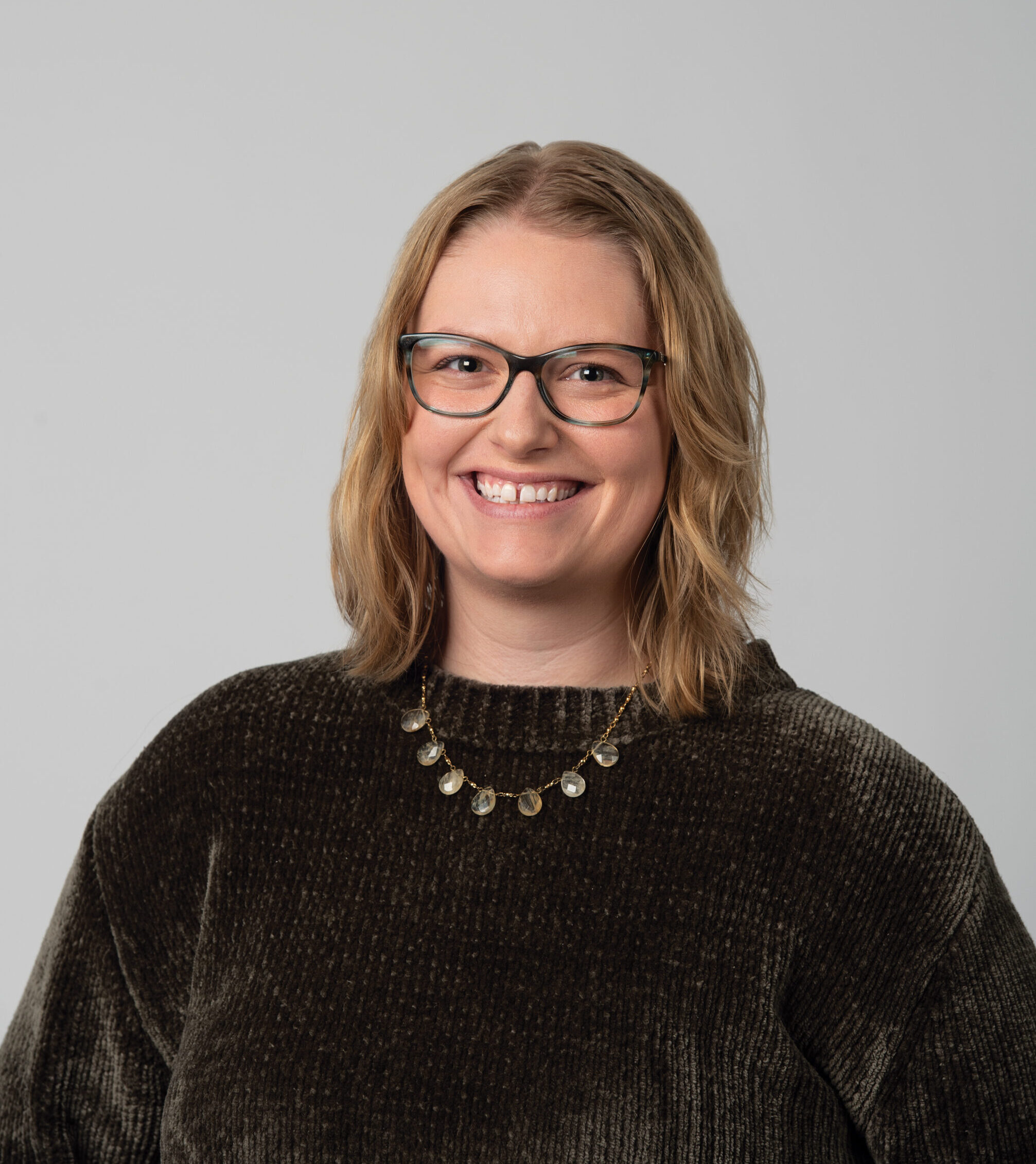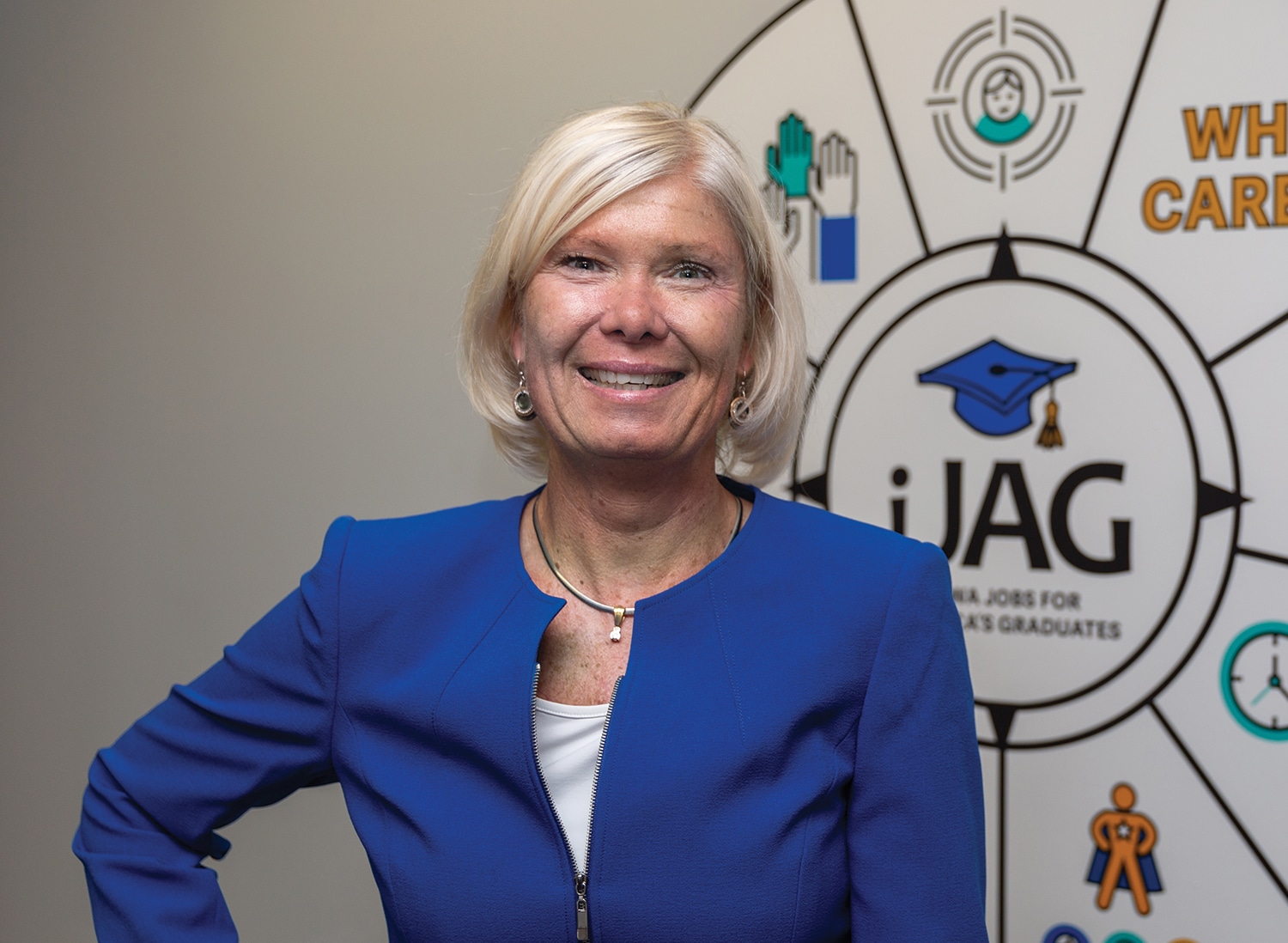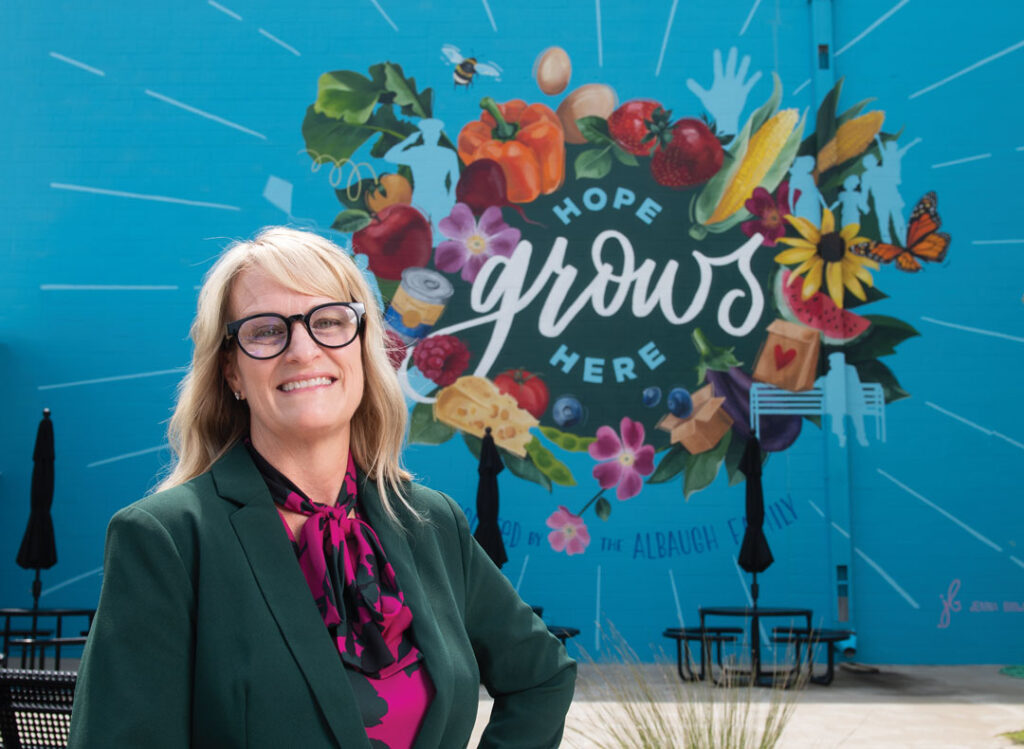A Closer Look: Wendy Mihm-Herold
President and CEO, Iowa Jobs for America’s Graduates (iJAG)

Just as she thought her career would be winding down, Wendy Mihm-Herold’s aspiration of working for an organization with statewide reach came true when she became president and CEO of Iowa Jobs for America’s Graduates, or iJAG, in January.
For the 12 years before joining iJAG, Mihm-Herold served in and around her hometown in northeast Iowa as vice president of business and community solutions for Northeast Iowa Community College.
She said that in recent years, she took time to reflect on the effects of the pandemic on her life. Sitting in on one of the trainings offered by the community college led her to realize she had the capabilities and desire to continue serving Iowa in a new way.
“I [was] like, this is what I want to do. I want to serve,” Mihm-Herold said. “I can use my knowledge, my talents, my skills, to help move [iJAG] forward because of their mission of growth to expand our services, because of our mission to serve students, lifting up students who are underestimated, to make sure that they have an opportunity for careers of academic success, and [it’s] really about making a total impact.”
Throughout her career in the nonprofit and public sectors she said she has built up experience “braiding” together federal, state, local and business resources and developing public-private partnerships to support workforce solutions and economic development. That experience will help iJAG grow its presence and impact across the state, she said.
The Iowa branch of the national Jobs for America’s Graduates program started in 1999 when former state education official Laurie Phelan detected a gap between what was being taught in school and life outside of the classroom. Since then, the Des Moines-based nonprofit has partnered with Iowa schools to provide career development programming, including leadership training and career education and services.
As of June, iJAG has 155 programs in middle and high schools across the state. Mihm-Herold plans to expand to 300 programs in the next three years. The organization is also homing in on its Drive to J initiative, which aims to ensure graduates of the iJAG program have an internship, apprenticeship or other work experience as they take their next step toward employment or further education.
We recently caught up with Mihm-Herold.
This Q&A has been lightly edited and condensed for clarity and length.
What was your career path before coming to iJAG?
When I graduated in the 90s from Iowa State, the unemployment rate was very high, so I became a professional volunteer. I worked for the Department of Corrections for one year. But then, because of the financial crisis in the state, I was laid off. Then I became a professional volunteer again, and I ended up getting my substance abuse certification and became a substance abuse and mental health counselor at the Northeast Iowa Behavioral Health center in Decorah. I did substance abuse counseling and started the first day-treatment program for people who experience brain health issues. I ran that for over five years and did case management. I was then recruited to be the executive director for a small nonprofit rehabilitation center called Spectrum Industries. I worked with individuals who experience disabilities, and helped them get rehabilitation training, to get them into the workforce. Then I started going to Drake University for my masters in rehabilitation administration. I stayed in that field, but then I was recruited by Rob Denson to look at a position at the Northeast Iowa Community College and Iowa Workforce Development where I was the regional manager for the workforce system. I covered a 10-county area, providing services to help businesses find employees and worked with unemployment, veteran services, individuals who had financial needs and had children. When I worked there in the 90s and into the 2000s, northeast Iowa had a number of layoffs, so I was working with individuals and helping them get the training through the community college so they can get into employment. A lot of my experience really stems from working in nonprofits, government and the public arena.
Where is the need for iJAG to help businesses connect to students?
What I learned from being in northeast Iowa is that businesses want to be connected. We just need to help them figure out that connection and make it easy because everybody’s busy running their business. The biggest part is about making sure to connect to students. Students are students, and sometimes they’re scared too — they don’t know what to expect. The whole continuum of working on work-based learning is really making sure that they have the career awareness and then making sure they have the preparation. It’s really that exposure and relationship-building, making sure that students have exposure, then making sure that they are seeing the relevance in their education of why they’re learning math and why they’re learning science and communication skills and public speaking skills, and how that can benefit them on the job. Then making sure that they see the companies and explore the companies.
iJAG doesn’t serve all students, it serves students who have a want, need and benefit, and who experienced barriers. A barrier can be being impacted by poverty, a barrier could be that their parents just recently went through a divorce, and that’s causing a lot of trauma in their life. It could be that they have a lack of work skills, it could be that the lack of knowledge of the world of work could be that they want to explore different career opportunities. It’s a leadership program that teaches career readiness, provides work-based learning opportunities and civics skills, holistically looking at them so that they have the soft skills and employability skills.
As you are only the second leader of iJAG in its 24 years, tell me about the leadership transition from Laurie Phelan to you.
One of the things that has helped me is because I’ve lived in this world, I haven’t been at iJAG, but I lived in this world at Northeast Iowa Community College and have been engaged in the state. From Laurie’s extreme passion, she built a mansion, and now my job is to take that mansion and to do some remodeling, enhancing the systems, because we’re adding new programs within a short period of time. So it’s really making sure that that growth strategy that we have the personnel policies and strategic operating processes in place. Because we’re a public-private partnership it’s making sure that we’re continuing to expand on those partnerships of funding and looking at ways that we can braid other state and federal resources to get that expansion. I want iJAG to be a household name so there isn’t a stigma that it’s just an at-risk program, or that it isn’t for students, because we have students who are student athletes to valedictorians. Just like you and I can look at 100 people and you can’t tell what’s going on in their lives. It’s really about helping them, and my hope is to have students come in and stay all years or if they come in for one year and get that impact. Where my strengths come in is looking at how we can be collaborative with partnerships that when we’re doing student events that we can bring in other students and the high school to participate with us, so that we’re not a standalone program in the high school. It’s about integration and partnerships.
What are some of the potential public-private partnership opportunities you see for iJAG’s future?
We’ve been really looking at the Drive to J, how we’re working on expanding work-based learning and doing some innovation in some of the programming. I’m a huge believer that you have to use your data to inform where you’re at. But in order to use your data, you need to look at your foundation. My true belief is that you fundamentally look at what is your baseline, making sure that you have your fundamentals in place, and then you do that tenfold. You think out there, where do you want to be? Getting to 300 programs is our tenfold. But to be able to do that, you have to have financial resources, staffing, training resources and process systems in place. I’m using my skills and experience to do that. When I worked at Northeast Iowa Community College, I was running business and community solutions. I got the fundamentals and the systems and structures in place and expanded it tenfold to be able to serve more businesses.
Over the course of your career and your time in the education sector, how have you seen the relationship between business and education grow closer?
My Ph.D. was on what are you going to do to grow the workforce in the state, in the nation? In 2010, the prediction was that the workforce shortage was going to occur because of the baby boomers retiring, the population growth, the growth in our jobs. I had the great opportunity to work in Dubuque, and Dubuque has always had the highest growth because they’ve diversified their employment sector markets. When you have a diverse economy, you have to have diverse skills. I’ve been looking at workforce solutions since 2010, and our Association of Business and Industry, the Iowa Business Council, economic developers, everyone’s looking at initiatives to look at how can you collaboratively work together and have a collective impact to make sure that you’re doing the best that you can to serve the business and the schools. There are amazing initiatives that are happening across the state and some great success. It all happens because businesses need the workforce and educators know that they want to connect this to the workforce because it makes sense. You want to make sure that you’re keeping your future so that they’re having children, so you can keep your school districts viable. Having that school district is very important to keeping our rural communities alive and viable. I think everybody has started to work together, from our Area Education Agencies, to our educational institutions, to our community colleges, to our state agencies, and that has been continually evolving and strengthening. Right now I’m on a work-based learning committee at the state level. When everyone is working together to continue to look at how can we enhance that in collaboration? I think that’s the beautiful piece, because when people try to do it alone, it’s hard because not one entity can do it. We started Dubuque Works with the Greater Dubuque Development Corporation. That’s been so strong with the outcomes because it’s focused on population growth, connecting the workforce, and looking at what you’re doing for recruitment or retention. You have to have all of that working together to make it happen, and I really see that the state and private associations have really done a great job of working together to do that.
What have you found applicable from your experience at the community college level to iJAG’s program working with middle and high school students?
Knowing about the career pathways and looking at what the workforce needs across the state and studying, that helps me to make sure that we’re staying focused on our career pathways. My goal is to make sure across the state that we have a really strong connection with all of the community colleges to look at what type of short-term training our students can get partnering with the community college system to assure that what they’re doing with their work-based learning, we’re not duplicating efforts. Also making sure that students are aware of the short-term training, the apprenticeship programs. Knowing a lot of that, I’m able to make sure that I’m working with our team and getting training and exposure so that our specialists are focusing on that with our students.
What role do you want iJAG to have in developing the future workforce?
Our role is that we hope that every one of our students by the time they graduate, have built relationships, understand and have developed a career pathway plan, and have a connection to their businesses, either locally or throughout the state so that they live, work and play in the state of Iowa, so that they are our future workforce. They’re our future voices because we focus on civic and community service. All of them do community service. We have them share their voice with us as well as legislators. They’re our future leaders, they’re our future legislators; they are our future.
What is your perspective on leadership?
For leadership, I think it’s about resilience. It’s having grit, having tenacity and passion about what you do. I believe that if you work hard and you analyze your data and you look at what you can do to enhance your programming, you’re going to make a difference in your state. That’s my passion. I love innovation. I love nimbleness. That’s why I love being at the nonprofit arena. My job is to coach and to grow future leaders. That’s what a true leader does, you leave the place better than when you walked in the door in some way. It’s not about you, it’s about your mission. If you stay focused on that and have the right team, you can really make a difference.
What are some words you live by?
My whole life is this one. “If you’re 70% sure about an idea, then go for it. If you wait until you’re 100%, you’ll never make a decision and never get anywhere.” You got to get off the tarmac, you got to get that plane going. You have to know where you’re going but you got to be willing to go off direction sometimes and you might have to wait on the tarmac for a little while. But you’ve got to be in a forward projection. Sometimes you have to use your gut, you have to use your instincts, you got to use data. You have to move. I’m a firm believer of that and you keep on tweaking it as you move forward.
At a glance
Hometown: Fort Atkinson, Iowa
Education: Bachelor of Science in family services, Iowa State University; Master of Science in rehabilitation administration, Drake University; Doctor of philosophy in education leadership, Iowa State University
Family: Husband Alvin; sons Mitchell and Jacob
Contact: wendy.mihm-herold@ijag.org

Sarah Diehn
Sarah Diehn is editor at Business Record. She covers innovation and entrepreneurship, manufacturing, insurance, and energy.










